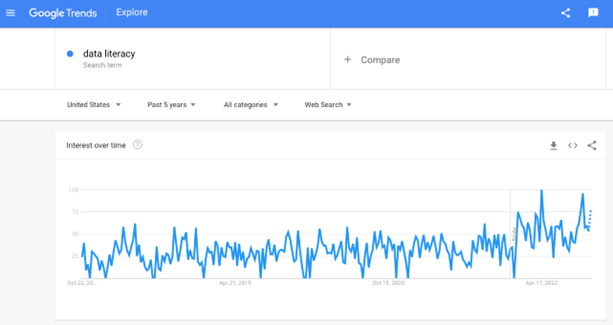
Data literacy has been a topic in the data and analytics space for several years now. Although, it feels like the level of interest has risen recently. I decided to check one of my favorite data sources – Google Trends – to see if my feelings had any support. You can see a jump at the beginning of 2022 for people searching for “data literacy,” and the step change in interest has continued throughout the year.

Why the jump in interest? While I don’t have a definitive answer, let me put forward a hypothesis. Many have implemented a data literacy effort over the past few years and experienced an initial bump of excitement, only to see the interest fade away. Those organizations are now coming back for data literacy round two and are looking for ways to be more effective and generate staying power.
I am even starting to see dedicated roles posted for “data literacy program leader” and the like. The job descriptions include objectives like “support employees’ ability to read, write and communicate with data.” The descriptions are also asking candidates to form a “tight partnership with the corporate Learning & Development team.”
Where have we been?
When I hear “data literacy,” I picture the data and analytics team building a training program. This has typically been a “side of the desk” effort by several members of the team. The hope is that the team will create some set of materials, deliver it to the business, and then there will be a flood of people from the organization who will start using analytics, abandoning their old ways of making decisions, and will request access to the self-service analytics environment that’s been created. This process typically goes something like this:
The team makes decisions about who to target.
- Is this for individual contributors?
- Is this for managers?
- Do we need separate materials for each, or can we use the same?
(BTW, see here for a good reminder from our IIA friend, Drew Smith, that we shouldn’t forget that the C-suite is part of our organization too.)
The team makes decisions about what to include.
- “We definitely need to talk through a confusion matrix.” “Right, let’s use the one from Wikipedia because it has all the metrics like recall and specificity.”
- “People need to understand the importance of ground truth, and the organization needs to provide it if it does not already exist.”
- “Do we need to talk to the organization about loss functions? Maybe we save that for the 200-level course.”
The team decides how to deliver the content.
- Should it go into our online learning portal? That would be great, but then it is in there with all the boring compliance courses.
- Should we deliver it in person? We could have snacks to get people to attend.
- Is it a multi-day course or a series of micro-courses?
These efforts do produce some success, especially for those with an interest or predisposition to data; however, these efforts may struggle to reach the bulk of the organization.
I think that we as the data and analytics team may need to stop and ask whether our friends in other parts of the organization want to take this course. Did anyone come to us and ask for data literacy training? Are people coming to us begging to know why data governance is an important initiative, or when to use a random forest?
Are we turning people off?
Let’s change gears for a second. We know branding is important. The words we use to describe a thing mean a lot.
Politicians know this. This is why so many bills introduced into Congress have names that nobody could disagree with.
- Remember the Marketplace Fairness Act? We all want fair markets. What was the bill really about? It was actually about charging sales tax to out-of-state online retailers. The right thing to do, but it wasn’t named the “Internet Sales Tax Act.”
- Sunshine Protection Act. I love my sunshine. Come January and February in the Midwest, I wish I had more of it. The bill was actually about making daylight savings permanent so we would no longer change our clocks twice a year.
- Lastly, just because it is a triumph for those fans of acronyms everywhere, please take a bow to the APPLE JUICE Act – Arsenic Prevention and Protection from Lead Exposure in Juice.
Why are we talking about branding? I think “data literacy” might have a branding problem.
I don’t think anyone would disagree with the word data. We all know that it is everywhere, it is growing like crazy, and its use shows no signs of slowing down.
“Literacy” might cause some issues. Oxford Languages defines literacy as “the ability to read and write” and “competence or knowledge in a specified area.”
However, what is the opposite of literacy? It is “illiteracy” or the “lack of knowledge in a particular subject: ignorance.”
I don’t think anyone wants to be called illiterate. This is especially true in a corporate setting where our raises and bonuses are based on things like competencies. By signing up for data literacy training, aren’t you now admitting ignorance in the area of data? Nobody wants to admit they are ignorant.
What are some alternatives?
How about “data coaching”?
I think many embrace the use of coaches nowadays.
Professional athletes, even those in individual sports, have a variety of coaches. They have nutritionists, coaches for a specific activity like throwing and hitting, and massage therapists, etc. Here’s a picture of Rafael Nadal’s team (if you’re not familiar with the game, Nadal is one of the greatest men’s tennis players ever). There are several tennis coaches, a physiotherapist, a head of communications, and a head of business development at his tennis academy in the group.

I like the use of the term “coaching.” To me, it conveys the notion that one is doing an activity, one has some level of ability, and there is a recognition that help is needed to get to the next level.
I’ve had the good fortune to work with three different coaches over the past five years. This helped me on a number of fronts.
- A career coach guided me on a number of professional fronts.
- A communications coach helped me prepare for a big presentation.
- A tennis coach helped me improve my swing and become a better player.
While coaching is my favorite alternative, there are some other good options to consider.
Here are a few of them:
- Data Apprenticeship – One definition of an apprenticeship states that it “trains someone to become skilled in a trade or profession, through a combination of classroom and hands-on work.” These have grown in popularity over the past few years as college costs have continued to rise. Google Trends shows an increasing level of interest in apprenticeships over the past number of years.
- Data Skilling – In a recent IIA webinar, Danielle Chabot at Travelers shared that she likes to use the term “skilling.” Though used often, “upskilling” can have a negative connotation, and “skilling” or “reskilling” may be a better choice.
- Data Fluency – In another recent IIA webinar, Kathy Koontz advocated for data fluency. Fluency is different based on role. Kathy used the example of traveling to a foreign country. The level of fluency needed to travel around and order food is different from the level needed to do a business deal in that country. (Skip to the 40-minute mark for the slide on data literacy).
Three actions we can take
Whatever we call it, the ability to interpret data and think critically about the implications is incredibly important, not just in our professional lives but also in our personal lives. Data is all around us. Just consider all the COVID numbers and charts that we’ve been staring at for the past few years.
Here are three actions we can take today to improve our data literacy (or data coaching!) efforts:
- Position yourself as a guide. You are there to help. You aren’t a lecturer with all the answers. Let’s come alongside our friends in the other areas of the organization. We should all be in this together, pulling toward the same objective. Each of us has our own expertise and experiences. Let’s use them and let’s pull in the same direction.
- Align training with needs. Your colleagues don’t need to know everything about data all at once. Could there be content on “engaging with data science teams” prior to the start of a new engagement? Or could we offer a micro-course on “the importance of data governance” prior to being assigned as a data steward? We know that reinforcing learning right after it happens is a great way to increase retention.
- Know what your attendees want. Are they looking for training so they can get access to a self-service portal? Do they want to know how to interpret existing reports better? Are they doing this because their manager said it was a requirement in order to get promoted? A focus on meeting our attendees’ desires will create the engagement we desire.